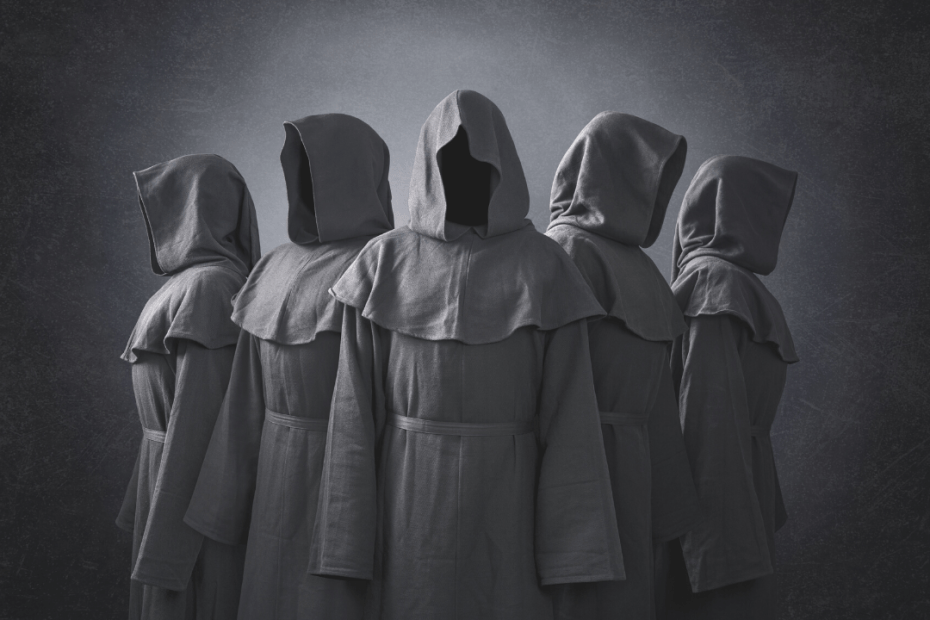Lorie Daybell aka the Doomsday Mom, NXIV, Mother God, the Church of Jesus Christ of Latter Day Saints… If you’ve been watching any streaming platforms or news networks, all these names will be very familiar to you. And it is something we also come into contact with pretty regularly during online counseling; modern-day cults.
The scariest thing about cults is probably the fact that they are never what we expect a cult to be. And anyone can fall prey to these “communities”.
Are Cults on the Rise?
It’s easy to watch TV and read the news and think that cults are increasing. Unfortunately, the official research agrees with you. Cults need very specific conditions to thrive, with one of the most crucial elements being uncertainty. Cue modern-day. Post-Covid, during a global recession, war raging between Ukraine and Russia, along with the normal everyday stresses of work, family and friends, and keeping households afloat… Uncertainty is at the order of the day.
This is the perfect recipe for creating scared people who are desperately searching for answers and solutions. It’s also the reason why the US alone boasts over 5000 cults. That’s more than double the numbers in 1978. And WAY more than what ends up on our TV screens or newspapers.
The “it won’t happen to me” Argument
This is a classic argument that most of us will use at least once in our lives. It’s because this argument makes us feel safe. It creates a divide between “us” and “them”, the “good guys” and the “bad guys”. And with good reason – because realising that the line between us and the “monsters” out there is mostly imaginary. Anyone is capable of murder, falling for a scam, becoming part of a cult, etc. is an incredibly scary thought.
In the case of a cult, many like to think that it’s those on the lower rungs of society and who are not really educated that get caught in a cult leader’s web of lies and misinformation. The truth is that most cults survive because of a few (very) affluent members funding the cult and their lifestyle like the Seagram liquor heiress, Clare Bronfman, did. Award-winning actress Glen Close spent 15 years of her life in a cult after her father (a renowned physician) got entangled in a spiritual movement called the MRA.
From research, we now know that those who join cults are generally middle to upper-middle-class people from the more advanced segments of the population. In fact, a study done with 31 former cult members showed that 61% had more than 12 years of education under their belts. So, the “it won’t happen to me” argument is a dangerous one to have when it comes to cults. Because it will actually make you less alert and even blind to the fact that you might already be getting involved in one.
What is a Cult?
Our first mistake is usually our perception of a cult. By the time people are committing atrocities, drinking the Kool-Aid, and branding themselves, the cult is already in its end phase and imploding. The basic definition of a cult is that it’s merely a group of people who have atypical or unorthodox beliefs and are generally led by a charismatic leader.
Take a look around you. By this definition it could include your local church, a political party, a support group… the list goes on. A cult usually has very humble beginnings with most individuals joining with the best of intentions – never once, believing that it would end the way it does. We can identify many cult-like belief systems during our online counseling sessions with clients who are completely unaware of their slow descent into cult status. This is why we need to be vigilant when it comes to the red flags and the point that a community, group, or organisation seems to turn into something we shouldn’t be a part of.
The Various Cults and Their Characteristics
Cults can generally be divided into 4 types:
- Doomsday Cults (where a lot of the beliefs surround the end of days, an apocalypse, the book of Revelation in the bible, etc.)
- Political Cults (any political beliefs that have turned extreme, whether left-wing or right-wing)
- Religious Cults (any spiritual beliefs that have turned extreme, whether based on an existing religion or a new movement)
- Sex Cults (where extreme or strange sexual behaviour is encouraged or any form of sexual abuse is present)
Cults can usually be distinguished by the following characteristics:
- Authoritarian Control; it will be extremely difficult for an individual to function independently from the rest of the group and most of the authority is kept by the group’s leader.
- Extremist Beliefs; the beliefs have grown to fundamentalist levels and there is usually some kind of punishment if these beliefs are ever questioned.
- Isolation; the group themselves have detached themselves from society with an “us” vs. “them” narrative, and the members of the group have also detached from friends and family.
- There’s a Pivotal Figure; wherever there is a cult, there’s a pivotal figure leading the group who enjoys the admiration of the group to such an extent that it borders on worship.
Am I or Someone I Love in a Cult?
Hindsight is 20/20 and something we work with a lot during online counseling. Sadly, the characteristics of a cult in groups or organisations only present themselves later, when you are already in the thick of it. So, it is important to see the warning signs beforehand and get out before it’s too late. If you spot the following in a group that you or a loved one are a part of, it’s time to consider leaving:
You’re Following a “big idea”
Any cult “sells” a big idea that will solve various problems. This could be promising financial freedom, “finding” yourself, never being lonely, and being privy to the “secrets of the universe”. But before you start throwing out every self-help book you own, it’s important to note that, in a cult context, whatever this “big idea” is, it is impossible to seek or achieve without the help of the group and its leader.
You are Constantly Reminded of How Much You are Loved
Cult bonds are fake family ties. Members are constantly told how much they are loved by the leader (almost as a parental figure). As well as by the other members (almost like siblings). The message of unconditional love and a sense of belonging also blinds you to the red flags. Why would someone that loves you that much cause you any harm?
There’s an “Us” vs. “Them” Narrative
The group is usually elevated to a certain level where they are the only ones privy to the truth. And it’s because certain life truths or worldly secrets are not revealed to others that the rest of the world questions the way they live. This belief essentially safeguards the cult and its leaders against any criticism or questioning and allows the leader to keep control.
Leaving is Detrimental
Deciding to leave the group is not as easy as just unsubscribing or unfollowing. Leaving will have real-life consequences such as being ostracised in your community, losing family/friends, having to sever business ties, etc.
The Group has Promised You a “New Life”
A cult usually promises some kind of “rebirth” whether personally or spiritually. This is also why many who find themselves in a cult, joined whilst in a transition phase of their life. This could be simply seeking a deeper spiritual connection or going through a divorce or having lost a job. The group offers a “new life”, a new and better chapter than that which you’ve experienced up to now.
What is Required from You to be a Part of the Group is Unreasonable
Cults will often require very unreasonable things from you that actually strip you of your independence and freedom. These things are usually asked within the context of things that are “in your best interest”. And for some reason relating to your personal growth or the “big idea” of the group. Things such as breaking ties with loved ones. Or “relinquishing” your earthly possessions (most of the time to the group itself).
Treating Cult Members
Cult members can end up suffering from a number of mental issues due to their experiences with the group. This can range from PTSD and anxiety to depression and other trauma responses. Depending on the amount of time spent with the group, and the level of involvement, it can take a very long time to unpack and process everything that has happened to a cult member. Hence why it will always be better to get out sooner rather than later.
If you recognise any of the red flags mentioned in this article. Or fear you or a loved one might be in a cult. Or you’ve been in a cult and struggle with some unresolved experiences and emotions. Please feel free to reach out to us. We are more than willing to assist via online counseling in a variety of languages and different time zones. Simply send a mail to info@personalonlinetherapy.com, or contact us via our website. Alternatively, you can just complete the form below and we’ll get back to you as soon as possible.

